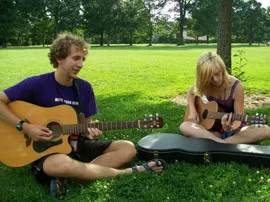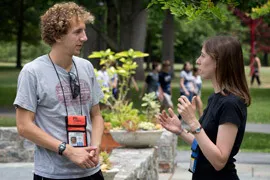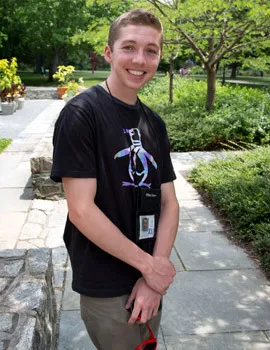Making Language Immersion a Reality

Although this summer marked his third stint as a residential assistant (RA) at Swarthmore College, recent graduate Charlie Huntington '12 found his four-week position offering unique challenges to now-familiar obligations. Living directly below the room he inhabited his senior year, Huntington fulfilled his usual duties with the additional challenge of communicating solely in Spanish with eleven middle and high school students under his care. His participation in Middlebury College's Monterey Language Academies mandated zero tolerance for spoken English throughout the program, even for beginning speakers.
Swarthmore College is now a flagship campus for the Middlebury Monterey Language Academies, offering approximately 260 middle and high school students ages 14-19 the chance to attend classes and participate in activities where only their target language is spoken. The four-week program is offered for Spanish, French, and Mandarin Chinese speakers. For the Swarthmore students and alumni working on staff, the camp offered the opportunity to synthesize past classroom experiences with future career and travel plans.
As RAs, Huntington and his colleagues Shawn Doherety '12 in the Spanish Academy and Sarah Hawkins '11 in the French Academy supervised their living group when classes aren't in session and enforced the program's no-English policy. Organizing trips to downtown Swarthmore and the pool helped keep students entertained during their downtime; sing alongs, board games, and the occasional Zumba class introduced elements of fun into the academic program.

"If you study a region of the world that doesn't speak English and you do it all through translation, you're relying on someone else's perspective and point of view to filter the words and thoughts of whoever it is you're studying. You can really only broaden your horizons so far if you're monolingual." - French Academy RA Sarah Hawkins '11
With a soccer camp drawing hordes of young players to campus, Hawkins found no shortage of conversation topics with the girls in her hall. "All the girls are going crazy for the boys in this soccer camp," she shared with a smile. "I saw a huge group of girls mainly from my living group sitting on the hill watching the boys pass by. I joined them and they were just telling me about all the boys that they liked and laughing and having a great time. It's great because you want to make sure they know it's possible to joke and have fun in French."
Hawkins returned for a second summer with the Language Academies after a year abroad teaching high school English in Marseilles, France. She thinks of her first summer with the program in 2011 as a preparatory boot camp for her job as a teaching assistant. A linguistics and languages major, she will be studying Middle Eastern studies at Oxford in the fall; however, she plans on maintaining her French as well as her Arabic as she continues with her studies.
For Huntington, the opportunity to work with the Spanish Academy provided a valuable experience in language immersion before his time abroad with the American University in Cairo this coming year. His experience studying Arabic at Swarthmore helped him sympathize with beginning speakers - like them, he was not allowed English in the classroom, although he was able to relapse into his native tongue after courses ended. "One of the really nice things that's been available to the counselors is that we get to talk to the language directors, and they've been explaining the methodology behind the various techniques for dealing with language immersion," Huntington said. "They've been showing what some techniques are for not knowing a word and some mental techniques for being okay with that, among other things. So I'm getting experience gesticulating and dancing around words because kids don't understand them, and when it becomes time for me to be in that position I think I'll be sympathetic and have some of the tools I need to get through it because of this experience."

"It's a lot of fun maintaining the blog, and I think I'm pretty good at it since I'm pretty good at corny parent humor. They love it, and they love seeing what their kids are up to." - Spanish Academy Program Assistant Ned Weitzman '15
While the RAs spoke and interacted with program-goers consistently throughout the day, office staffers made time amidst their other duties to get involved with the kids. Information Technology Coordinator Alex Cannon '14 and Spanish Academy Program Assistant Ned Weitzman '15 took advantage of meal times and group activities to brush up on their Spanish and go above and beyond the parameters of their job descriptions.
"Getting the kids to figure out how to say things is what gives me a different perspective on the language," Weitzman said. "Before this, I had no idea how one would teach beginning Spanish to kids who knew three words and were immersed. I've been amazed by how the faculty are able to teach basic cafeteria vocabulary and the kids don't even realize they're having a vocabulary lesson. I always had a really hard time explaining what I meant in Spanish without just saying the English word for it, so I think learning new ways to do that opens a lot of doors within the language - once you can express an idea without knowing the exact word for it, you're really set."
Beyond taking care of loose odds and ends on campus, Weitzman maintained the program's blog, detailing daily activities and new experiences with "corny parent humor" for interested readership. "Writing the blog gives me a reason to know what's going on with the kids - it's a way to stay very connected with what's going on, and it's just a fun thing for parents, to be able to read about what crazy new food their kid cooked in elective today." To keep up to date on daily happenings, Weitzman sits in on classes and keeps in contact with the Residential Advisers in addition to patrolling the campus.

"I've never seriously considered Spanish as a career path, but I'm sure it will help me in the future. Just being able to speak a different language can be useful in so many ways. Hopefully it will play some sort of role in my future." - Information Technology Coordinator Alex Cannon '14
Cannon, who traveled to Ecuador last summer through the Village Education Project, sees his work with the Language Academy as feeding both his interest in Spanish and preparing for what he hopes to be a future career in the tech industry. As IT Coordinator, Cannon made morning rounds troubleshooting classroom technology and provides support for large-scale evening events. "The program is kind of related to my work with the Village Education Project in that it combines language and learning with technology," Cannon, a double major in economics and computer science, said. "Those are two things that I really enjoy because I love experiencing new things, including new cultures, and I feel like that's what language is all about - it's giving you access to a whole different culture and a whole different perspective, and with this program I'm able to combine that with my interest in technology."
Like other Swarthmore students and grads involved in the program, the combined experiences of immersion and educational leadership provided Cannon with a strong jumping-off point before embarking on future travels. Now that the program has ended, he plans on buying a plane ticket to South America and exploring the region before classes resume at Swarthmore. He will spend his spring semester studying abroad in Madrid.
"If you study a region of the world that doesn't speak English and you do it all through translation, you're relying on someone else's perspective and point of view to filter the words and thoughts of whoever it is you're studying," Hawkins said of the importance of studying language. "If you study literature purely in translation, for example, you have that extra roadblock up; if you study abroad and never really get a grasp on the language you're studying, there's always a barrier erected between you and the people around you. You can really only broaden your horizons so far if you're monolingual."



